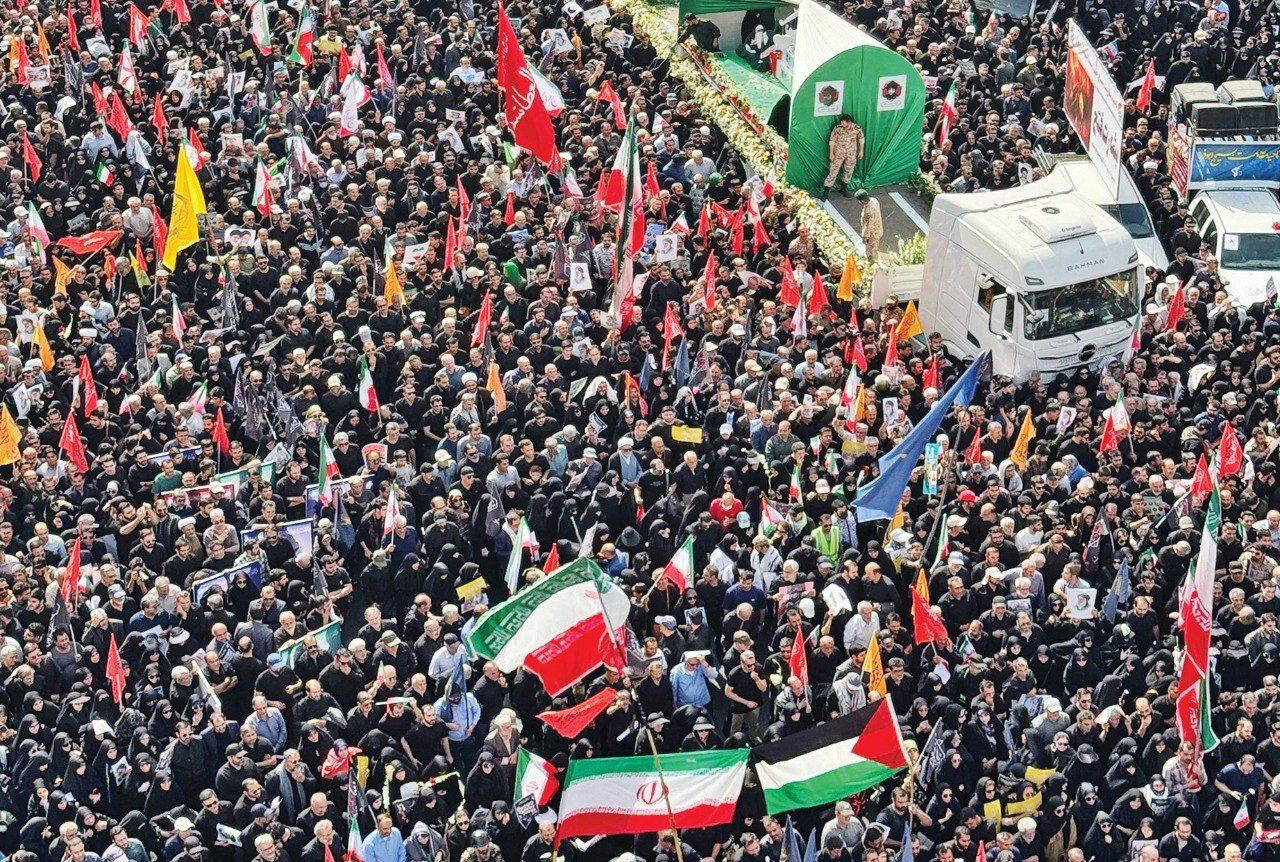Hearts mourn nation’s heroes
Millions attend the funeral in Tehran to say farewell to commanders and scientists martyred during Israel’s war on Iran

TEHRAN – Tehran, Iran's beating heart, has witnessed centuries of tragedies as the nation's capital. It has seen all the major events and dramas that have sculpted the ancient land's modern history.
Tehran remembers the sting of foreign boots during the two World Wars, wars that brought deadly, man-made famines, costing millions of Iranian lives. It remembers the fall of the democratically elected government of Mosaddegh, orchestrated by the U.S. and UK. It remembers the missiles Saddam Hussein rained down during the brutal, eight-year invasion. And most recently, it mourned the loss of its brightest minds, commanders, and scientists, once again victims of the West's enduring colonial ambitions, now channeled through its proxy, Israel.
But during the funeral procession taking place on Saturday, there were more emotions across each and every corner of Iran than just grief and sorrow. The millions who flooded the streets to honor their fallen commanders and officials were also brimming with pride. Pride that, after decades of bowing to foreign aggressors, the country had finally managed to punish the attacker, force it from its borders, and maintain its sovereign ground.
The funeral procession began at 8 AM in one of the city's central squares, stretching 11 kilometers to another. People from all walks of life joined the march: young and old, men and women, religious and non-religious. Tears streamed down many faces. A middle-aged woman, accompanied by her children, glanced at the coffin of Amir Ali Hajizadeh, the general hailed for significant contributions to Iran's formidable missile power. She wept briefly, then wiped her eyes and began chanting slogans. "They thought killing Hajizadeh would stop his missiles from reaching them," she told reporters. "But within 12 hours, those very missiles struck their strategic sites, left their cities in ruins, and crushed their spirits. His disciples will only forge even more deadly weapons to defend this nation."
General Hajizadeh was among the several commanders assassinated by Israel at the start of the war on June 13th. In the twelve days that followed, the regime escalated its aggression with attacks on Iranian nuclear facilities, military sites, more residential buildings, and civilian infrastructure. In total, 627 lives were lost during these Zionist attacks.
Israel claims its attack on Iran was to prevent the development of nuclear weapons – weapons the regime has been claiming for two decades that Iran is just "two weeks away" from acquiring. In reality, however, the decision for Israel to attack Iran is widely believed to have been made with the United States' full support and eventual direct involvement, based on two key assumptions: first, that assassinating top military commanders would paralyze any Iranian retaliation; and second, that the attacks, coupled with a savvy propaganda campaign, would incite Iranians to rise up and overthrow their government. The people did eventually take to the streets, but their reasons were the polar opposite of what Israel had envisioned.
Analysts suggest that the unwavering unity displayed by Iranians was even more decisive than the country's military strength and its arsenal of missiles and drones in defeating the enemy. After centuries marked by foreign-backed humiliation and tragedy, Iranians now understand that their country is their ultimate sanctuary, and that the price of resistance will always be less than the "total surrender" demanded by U.S. President Donald Trump. During WWI, WWII, and the coup of 1953, fragmentation and disunity were some of the major reasons Iran was subjected, next to the impotence of the rulers. Iranians’ collective and historical memory has taken note of that.
“They can start a war again,” said a man in his 20s who told me he was getting ready to complete his mandatory military service. "But we'll write the ending again this time. Those days are over when foreign powers could dictate what we can and cannot do. We will continue our peaceful nuclear program, and we will crush any force that tries to stop us."
Iran ended up razing large swathes of the occupied territories to the ground during its war with Israel. It also attacked Washington’s biggest base in West Asia, the Al Udeid Air Base in Qatar. Iranian officials say any new aggression against Iran will be met with even more forceful responses.
Leave a Comment